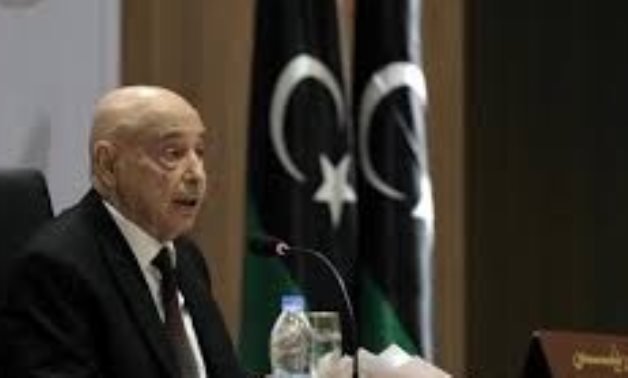
Aguila Saleh, Libya's parliament president, speaks during the first session at parliament headquarters in Benghazi, Libya April 13, 2019. REUTERS/Esam Omran Al-Fetori
CAIRO - 22 February 2020: Speaker of the Libyan House of Representatives, Agila Saleh, said during his meeting with Al-Arabiya Al-Hadath channel that the interim Libyan government should work from Sirte to avoid armed groups, adding that Tripoli is not safe, unfortunately, due to the presence of militias.
"I called on Head of the Libyan Presidency Council, Muhammad al-Manfi, and Libyan Prime Minister, Abdel-Hamid al-Dabaiba, to expedite the removal of the mercenaries," he added.
"We deplore the attack on Minister of Interior of the Government of National Accord (GNA), Fathi Baghasha, which also means that the GNA government does not control Tripoli, as the assassination attempt on Bashagha confirms the militias control the capital," Saleh said.
Saleh said that the study of previous agreements at that time was due to the existence of a permanent authority with legislative approval, explaining that the parliament session would be held in Sirte to give confidence to the government after its formation.
Saleh further indicated that changing the internal regulations only takes place at the main headquarters of the House of Representatives, in accordance with the constitution, and in the presence of 120 deputies. “My resignation or dismissal is useless at the moment, in light of the current political circumstances," he asserted.
Furthermore, the Libyan Parliament speaker stated, “We will support the government if it commits to the tasks assigned to it… We insist on holding the elections on the scheduled date, December 24.”
Saleh also noted that the constitutional declaration explained how the head of state should be elected; thus the elections will be held in accordance with the constitutional declaration.
Additionally, Saleh clarified that strengthening institutions, providing citizens' needs, and completing the reconciliation process atop the government’s priorities, asserting that it is not within the powers of the next government to conclude long-term agreements because they are transitional.
"Reconciliation is obligatory for all Libyans, and the page of the past must be turned… I did not run for the presidency of the Presidency Council. The Dialogue Committee nominated me," he reiterated.
"We respect the will of the people in choosing their representatives in the government and the Presidency Council. The government must achieve equality in the distribution of positions," Saleh concluded.
Libyan delegates at UN-facilitated talks on Feb. 5, made the surprise choice of Abdul Hamid Mohammed Dbeibah as transitional prime minister, along with a three-member presidency council, to govern the war-ravaged North African country until December elections. Mohammad Younes Menfi became the new president of the presidency council in the unity administration, following the vote held outside Geneva and announced by former United Nations envoy Stephanie Williams.
Libya has been in chaos ever since the 2011 overthrow and killing of dictator Moamer Gaddafi in a NATO-backed uprising, with warring rival administrations battling for power. Since the downfall of Gaddafi, Libya has become a key route for irregular migration from Africa into Europe, across the Mediterranean Sea.
Several countries seek to solve the Libyan crisis, most prominently Egypt, which hosted the third meetings of the Libyan Constitutional Track from February 9 -11 in Hurghada, in the presence of delegations of the House of Representatives and the Supreme Council of State under the auspices of the United Nations.
In January 2021, the Libyan Constitutional Committee meetings were also held in Hurghada for a period of three days, in the presence of members of the House of Representatives and the State Council sponsored by the United Nations Support Mission in Libya.
At the end of 2020, a Libyan meeting was held in Cairo between representatives of the Libyan House of Representatives and the Supreme State Council in Libya, as part of the efforts, led by Egypt and sponsored by the countries of the region to support the path of a political solution in Libya.
In September 2020, Egypt's Hurghada hosted meetings between Libyan military and security leaders representing the east and west of the country, to agree on the military and security tracks.
Comments
Leave a Comment